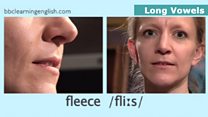Unit 19: Towards Advanced
Grammar, news, vocabulary and pronunciation
Select a unit
- 1 Towards advanced
- 2 Towards advanced
- 3 Towards advanced
- 4 Towards advanced
- 5 Towards advanced
- 6 Towards advanced
- 7 Towards advanced
- 8 Towards advanced
- 9 Towards Advanced
- 10 Towards Advanced
- 11 Towards Advanced
- 12 Towards Advanced
- 13 Towards Advanced
- 14 Towards Advanced
- 15 Towards Advanced
- 16 Towards Advanced
- 17 Towards Advanced
- 18 Towards Advanced
- 19 Towards Advanced
- 20 Towards Advanced
- 21 Towards Advanced
- 22 Towards Advanced
- 23 Towards Advanced
- 24 Towards Advanced
- 25 Towards Advanced
- 26 Towards Advanced
- 27 Towards Advanced
- 28 Towards Advanced
- 29 Towards Advanced
- 30 Towards Advanced
Session 5
Tim's Pronunciation Workshop: linking /j/
Tim looks at what the linking /j/ is - and when it appears
Activity 1
Tim's Pronunciation Workshop: linking /j/
Are you happy?
Tim's back in his pronunciation workshop. This time he's finding out how happy the people of London are - and he's wondering where the little /j/ sound is coming from...
To do
Take a look at the video, then try the activity to do some practice.
Watch the video and complete the activity

Tim
Hi. I'm Tim and this is my Pronunciation workshop. Here I'm going to show you how English is really spoken. Come on, let's go inside. Are you a creature of habit? For example, do you have a routine in the mornings? Every morning, I like to have a cup of tea and a chocolate biscuit. Mmmm. This is what some people in London told us when we asked them what they do in the mornings
Voxpops
I always have some breakfast.
I always go to the gym in the morning.
I always drink a glass of warm water when I wake up.
Tim
One thing that happens when we speak English fluently is that we sometimes add sounds between words to help link them together more smoothly and easily. Listen again. Can you hear another sound between the words I and always?
Voxpops
I always have some breakfast.
I always go to the gym in the morning.
I always drink a glass of warm water when I wake up.
Tim
Did you catch it? It’s hardly there but when one word ends in /aɪ/, /ɪː/, /eɪ/ or/ɔɪ/ sound, and the next word begins in a vowel sound, we can smooth the link out by adding a small /j/ sound. I always [slowly] becomes I always [fluently]. This is sometimes called the linking /j/. But be careful, your mouth normally does this naturally as your mouth changes shape between the sounds. You don’t actually want to add a full /j/ sound. Here are some more examples.
Examples
When I go on holiday I just want to lie on the beach.
The end of the film was brilliant.
I ate the whole cake in one go.
It was too high up for me to reach.
Tim
Right, now you've heard the examples, and now it's your turn. You know the drill: listen and repeat.
Examples
When I go on holiday I just want to lie on the beach.
The end of the film was brilliant.
I ate the whole cake in one go.
It was too high up for me to reach.
Tim
Well done. And remember, if you want to learn more about pronunciation, then please visit our website, bbclearningenglish.com. And that is about it from the pronunciation workshop for this week. I'll see you soon. Bye bye! Right, now I've been looking forward to this biscuit. Actually, do you want to see a magic trick? Now you see it, now you don't. What? It's a magic trick – magic!
To do
So that's linking /j/. Now try this activity to get some more practice.
The linking /j/ game
5 Questions
Choose the phrases that have linking /j/.
Help
Activity
Choose the phrases that have linking /j/.
Hint
When a word ends in /aɪ/, /ɪː/, /eɪ/ or /ɔɪ/, and the next word begins with a vowel, we can smooth out the connection between the words with a small /j/ sound.Question 1 of 5

Help
Activity
Choose the phrases that have linking /j/.
Hint
When a word ends in /aɪ/, /ɪː/, /eɪ/ or /ɔɪ/, and the next word begins with a vowel, we can smooth out the connection between the words with a small /j/ sound.Question 2 of 5

Help
Activity
Choose the phrases that have linking /j/.
Hint
When a word ends in /aɪ/, /ɪː/, /eɪ/ or /ɔɪ/, and the next word begins with a vowel, we can smooth out the connection between the words with a small /j/ sound.Question 3 of 5

Help
Activity
Choose the phrases that have linking /j/.
Hint
When a word ends in /aɪ/, /ɪː/, /eɪ/ or /ɔɪ/, and the next word begins with a vowel, we can smooth out the connection between the words with a small /j/ sound.Question 4 of 5

Help
Activity
Choose the phrases that have linking /j/.
Hint
When a word ends in /aɪ/, /ɪː/, /eɪ/ or /ɔɪ/, and the next word begins with a vowel, we can smooth out the connection between the words with a small /j/ sound.Question 5 of 5

Excellent! Great job! Bad luck! You scored:
End of Unit 19
We hope that was useful. In Unit 20, Masterclass will show you how to make subjects and verbs agree - with Dan. In News Review and LingoHack you can find out which words are making the headlines - and Tim will be back with the pronunciation workshop as usual. See you there!
Session Vocabulary
Linking /j/
When a word ends in /aɪ/, /ɪː/, /eɪ/ or /ɔɪ/ and the next word begins with a vowel, we can smooth out the connection between the words with a small /j/ sound.Some examples of phrases where this might happen include:
- I ate the whole cake.
- It was too high up to reach.
- That boy is mine.


